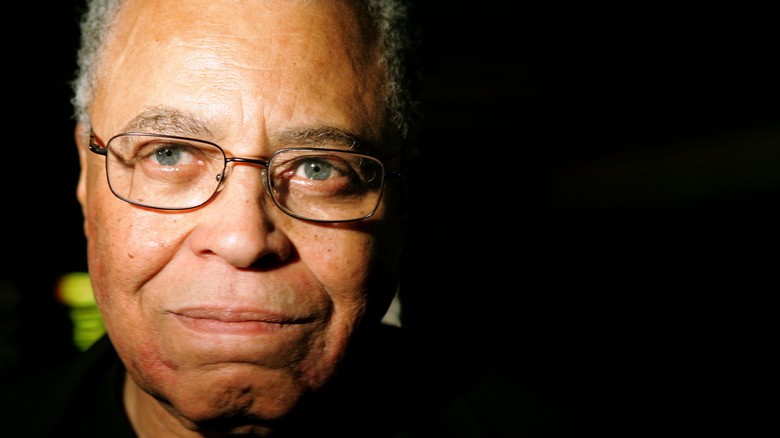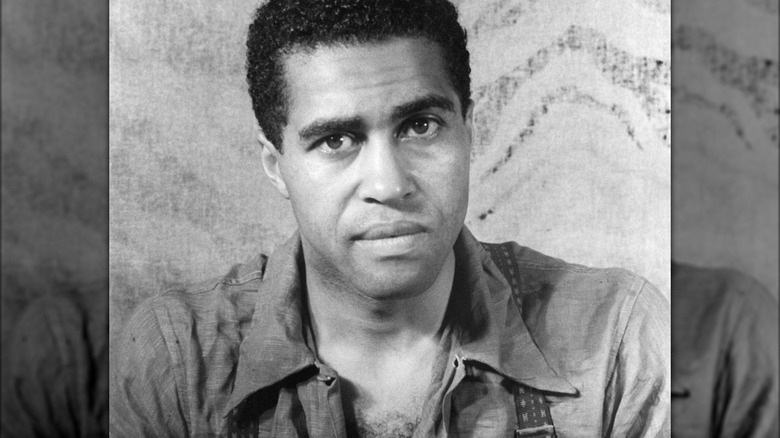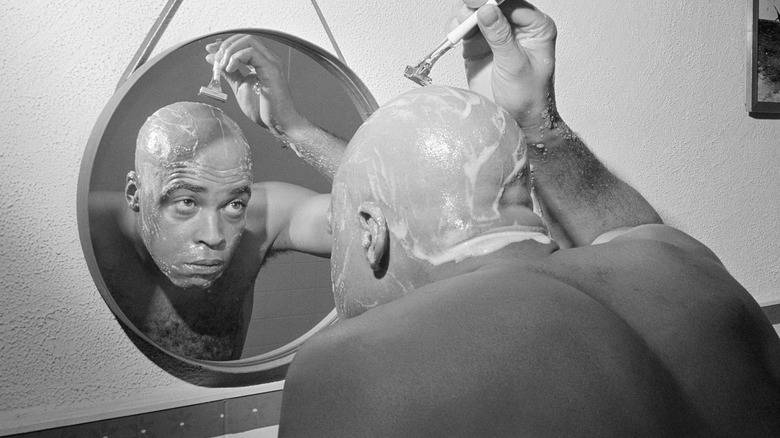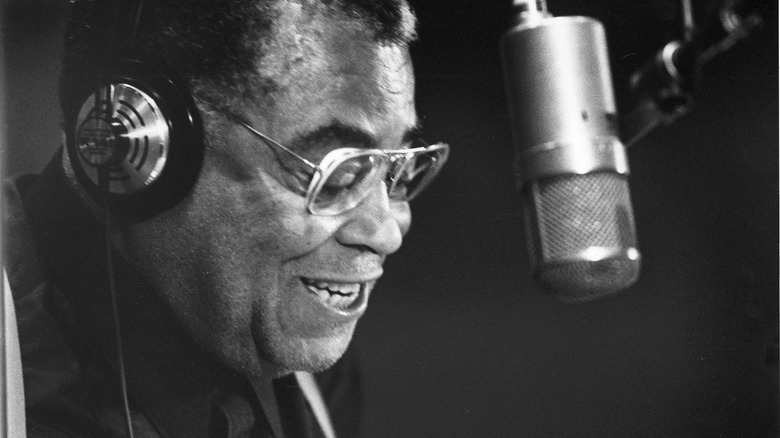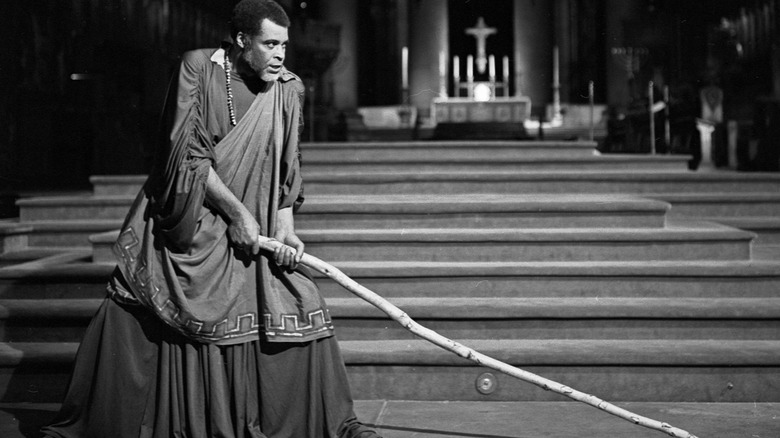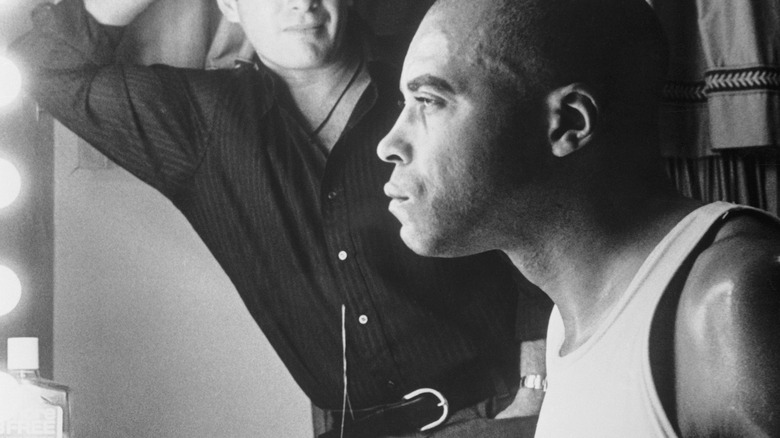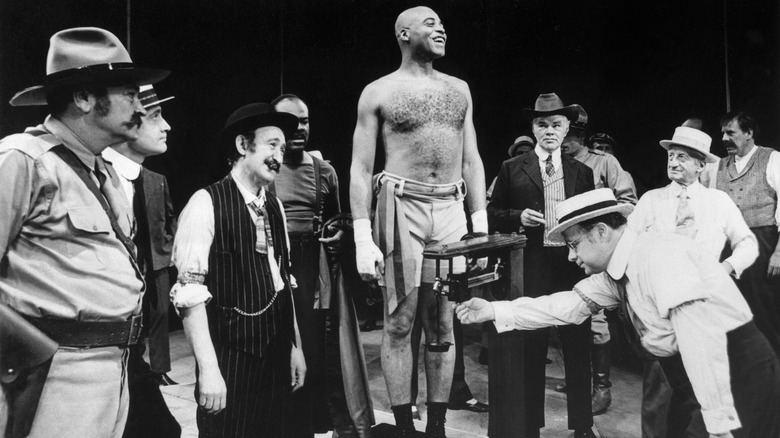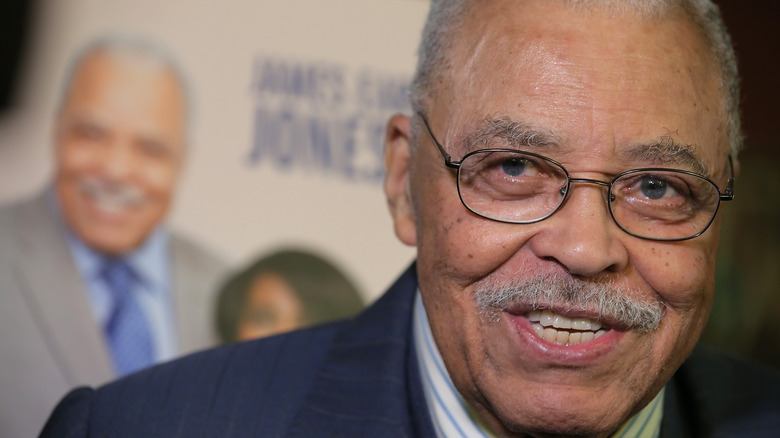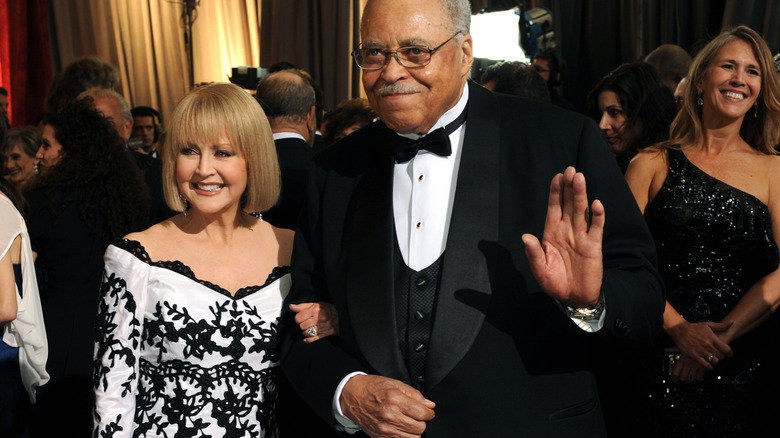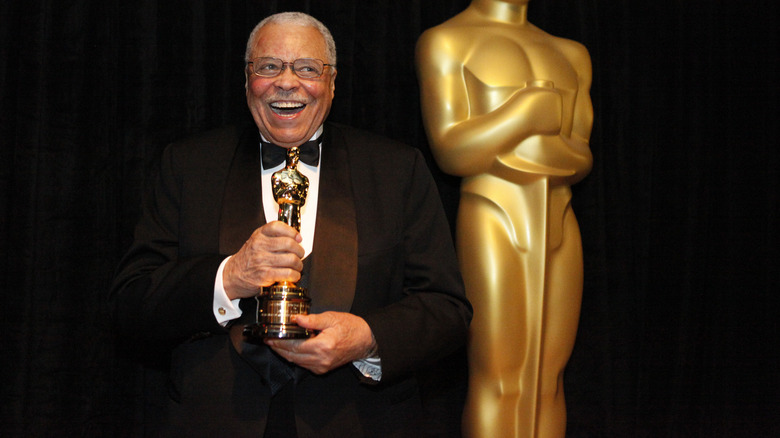The Tragedy Of James Earl Jones Explained
Few performers had the stage presence of the legendary James Earl Jones. Would "Star Wars" have hit in quite the same way had the big bad guy not had that rumbling, chill-inducing voice? Possibly not, and Jones wasn't always slated to record Vader's voice. Interestingly, he's often been reported as having a baritone voice, whereas it was more accurately a bass, and at least once (via Classic FM) it was described in this beautifully epic way: As the voice "Moses heard when addressed by God."
Jones may have become known for his voice and his commanding stage presence, but it was that same voice that was once a source of shame. Childhood trauma led a young Jones to develop a stutter that he was so humiliated by that he fell silent for years, and would later say for his memoir, "Voices and Silences": "The written word is safe for the stutterer. The script is a sanctuary."
The story of the loss and rediscovery of his voice is the story of his path to the cultural icon that he became, and the road was not an easy one. Born in Arkabutla, Mississippi, in 1931, his story is a struggle to not only overcome a stutter, but also childhood loneliness, racism, health challenges, and family difficulties. In spite of it all, he left an indelible mark on the world, which isn't entirely surprising. He did, after all, once observe (via Russh), "Speech is a very important aspect of being human. A whisper doesn't cut it."
He had a difficult relationship with his father
James Earl Jones wasn't the only actor in his family, and when he was trying to break into the New York scene in the 1950s, he lived with his father, Robert Earl Jones (pictured). He appeared in films like "The Sting," "Trading Places," and "Witness," but he may well have had a bigger career had his association with left-wing groups not gotten him the attention of the House Un-American Activities Committee, and a subsequent blacklisting. The time that father and son spent together in New York was new for them both, since they didn't meet until James was 21 years old.
When James was born in 1931, his parents had already split and he was sent to live with his maternal grandparents. Fast forward to the 1950s and a desire to make it in the acting business, and he found himself meeting the father he had only seen in photos.
The meeting was more about practicality than sentimentality, and James told The Guardian that he simply hadn't been able to afford NYC rent. "It was too late to get to know him as a father: if you don't learn that from the beginning, there's no way to catch up. It took us a time to accept that if we could be friends, that would be best." Still, James did give his father credit for helping him realize that he really could make it as an actor. "He said, 'You can act.' ... Father to son, that's all I needed to hear."
A difficult childhood left lasting emotional trauma
Although James Earl Jones spent most of his childhood living with his maternal grandparents, it wasn't a settled life. When the household grew to 13, it was decided that they were going to move 5-year-old Jones from the Mississippi that he knew to live with his paternal grandparents in Tennessee.
He wouldn't let go of the car when they tried to drop him off, and he told The Guardian, "It was the only way I could express that I wanted to be with them. They accepted that." From there, it was a move to Michigan to find a way through the tough years of the Great Depression. It, too, was far from happy, and Jones would later say that this was about the same time that his mother moved away from them completely. In his memoir "Voices and Silences," he said, "A world ended for me, the safe world of childhood. The move from Mississippi to Michigan was supposed to be a glorious event. For me it was a heartbreak..."
Matters were complicated by his grandmother, who he described to the BBC (via HuffPost) as "the most racist, person, bigoted person I have ever known. She trained us that way. She would consider it defensive racism, but it's still racism, it's still the same poison." Jones said that it wasn't until he went to school that he started to realize that people were not nearly as bad as he had been taught, and found himself needing to reevaluate everything he had been taught.
He felt he was cursed by a stutter for years
James Earl Jones may be most well-known for his voice, but not long after he moved to Michigan, he developed a stutter that was so pronounced that he simply stopped speaking. Embarrassment deepened into loneliness and depression, and in an interview with the Mail on Sunday, Jones explained that at one point, he believed it was a curse.
He grew up with an uncle who was only four years older than he was and who also stuttered. Jones revealed, "I used to imitate him. I don't know whether I was imitating him to keep him company or to embarrass him. And then I ended up stuttering myself. I feel I was cursed." Today, research has shown that there can be a genetic component to stuttering, and Jones said his stutter depended on who he was around. He was able to speak to certain family members, and added, "I did communicate with the animals quite freely, but then that's calling the hogs, the cows, the chickens. They don't care how you sound, they just want to hear your voice."
Painful memories were long-lasting, and he recalled reading aloud in class: "The children behind me were falling on the floor with laughter," he said. He was unable to introduce himself to new people — "It was too painful," he told NPR in 2014, and that that time, he said that he still stuttered and relied on the tools that he had learned along the way to help manage it.
The teacher who helped him find his voice had a heartbreaking story
In an essay for Guideposts, James Earl Jones wrote about his stutter and the teacher who helped him discover his love of poetry, the written word, and, by extension, the spoken word. His stutter had led him to drop out of Sunday school, and unable to speak in class, he was tested and graded on what he wrote. "That awful feeling of my voice being trapped got worse as I grew older," he explained.
He met a retired college professor turned high school teacher named Donald Crouch, who was a particular fan of poetry. He memorized one poem a day in case he ever went blind, and when he told Jones that he believed a poem he'd turned in wasn't his own words, he told the teenager to stand up in front of the class and recite it. Jones did — flawlessly — and credited that moment for turning around years of silence.
Years later, Jones was performing in a production of "Timon of Athens" when he called his old teacher and asked him to come to the theater. Jones wrote, "'Jim,' he sighed, 'I'm blind now. I'd hate not to be able to see you acting. It would hurt too much.'" Crouch died two years later: "I thanked God for all the professor's help and friendship. And so, when I was asked to record the New Testament, I really did it for a tall, lean man with gray hair who had ... helped me find abundant life."
James Earl Jones spoke about the racism he faced
Racism can be complicated, and when James Earl Jones spoke about the lasting impact that his grandmother's racist views had on him, he explained to the BBC (via HuffPost) that it had given him a unique insight into how and why racist beliefs developed. "When I hear about racists, I know exactly what they're feeling. ... I know what they're going through."
Jones — who was born in 1931 — spoke with PBS a bit about being very aware of the dangers he would have faced had he and his family not left Mississippi. "When I came into my manhood, I would have been prime for lynching," he said. Because I think all women are beautiful and I would have goggled women regardless of their color. ... it just is one [aspect] that I always think about. If I hadn't moved to the north, I could easily have been a target."
When it comes to casting, Jones has also been honest about feeling as though he got his first job — in Stanley Kubrick's "Dr. Strangelove" — because of the color of his skin. He appeared on The Dick Cavett Show and spoke about Kubrick scouting for his cast, and seeing Jones alongside George C. Scott in "The Merchant of Venice." Jones said that Scott was already on the shortlist, and after the performance, Kubrick was reportedly heard to remark, "I'll take the Black one, too." (Click here to learn more about Staley Kubrick's on-set behavior.)
James Earl Jones struggled early in his career
It's easy to assume that A-list actors have it all planned out, but according to James Earl Jones, that was never the case with him. In an interview with The Guardian, Jones once said, "I'm just on a journey. Whenever I run across a job, I say, 'OK, I'll do that." The only thing that was off-limits was politics, and according to the BBC, he had explained, "My politics are very personal and subjective."
And it makes sense: His father's career was derailed when he got the attention of the House Un-American Activities Committee, and when father and son were living in New York City trying to break into the business, it wasn't easy. They worked cleaning floors and theaters to make ends meet, and even when Jones started getting work, it wasn't the work that he wanted.
Early on, he found himself pigeonholed into roles like tribal leaders. Although he would ultimately have nearly 200 acting credits to his name, he spoke about being incredibly dejected when he was offered roles he felt he couldn't relate to. After starring in "The Great White Hope" in 1970, he turned down a massive opportunity: playing the title character in "Shaft." Jones said that the only thing he had in common with the character was skin color, and the incident had such an impact on him that, according to The Washington Post, he started eating more to put on weight and to try to discourage those offers.
He was candid about his health issues and diabetes diagnosis
At the time of his death in 2024, the 93-year-old James Earl Jones was one of the oldest living actors in Hollywood. In a 2012 interview with The New York Times, the then-81-year-old got candid about some of the health issues that were coming with his advancing age. Having sinusitis — a condition that necessitated prescriptions for nasal sprays — Jones said that while he was performing on Broadway in "Gore Vidal's The Best Man," he was keeping an oxygen machine just off-stage. After an incident where he forgot some lines during a performance of "Cat on a Hot Tin Roof," the machine was always close at hand.
In 2018, Jones went public about other health concerns. In an interview with Good Housekeeping, he revealed that he had been living with type 2 diabetes for nearly two decades, saying, "I didn't notice any symptoms. My doctor ... encouraged me to go get a test, and I did — and there it was: Type 2 diabetes. It hit me like a thunderbolt."
He spoke, too, of how it forced him to take a look at aspects of life. In an interview with Healthline, Jones spoke about knowing nothing about diabetes except that his mother had been diagnosed with it, and admitted that it had been hard to ask for help: "I find that living with type 2 diabetes is one of the most challenging roles I've ever had. That's what I am ready to talk about."
His wife of more than 30 years died of ovarian cancer
In a 2012 interview with The New York Times, James Earl Jones started out by making it clear that it was the job that he loved, not the fame. "The real part of theater is being onstage with your fellow actors. The fake part is the glitter of it — that's not nothing to do with the work of show business," he explained. He also explained that it was his wife, Cecilia Hart, who helped keep him focused, "She's how I stay grounded," he said, and at the time, they had been married for 30 years.
When Jones accepted a Lifetime Achievement Award in 2017, he thanked Hart for being his constant companion. Sadly, the acknowledgment was a posthumous one: She died in 2016, after being diagnosed with ovarian cancer.
At the time, Hart was 68 years old. She and Jones had met in 1979, married in 1982, and performed together that same year: She was Desdemona to his Othello. At the time of the show's run, she was pregnant with their only son, Flynn. He hasn't had the show business career of his parents, but he has narrated several Audible audiobooks.
There was an outpouring of tributes after his 2024 death
On September 9, 2024, James Earl Jones was added to the list of Star Wars actors who have tragically passed away. His death was confirmed by his agent, and at the time of his passing, he was 93 years old. There were only a handful of actors from the main, original cast left, and one of the most touching tributes was posted by Luke Skywalker himself, Mark Hamill. He simply wrote on X (formerly known as Twitter), "#RIP dad"
Others who had worked alongside Jones also added their tributes. Kevin Costner posted on Instagram, "That booming voice. That quiet strength. The kindness that he radiated. So much can be said about his legacy, so I'll just say how thankful I am that part of it includes Field of Dreams." LeVar Burton — host of "Reading Rainbow," the iconic television show that featured Jones in an episode of season one — wrote on X, "James Earl Jones... there will never be another of his particular combination of graces."
Tributes poured in from across all areas of the entertainment industry, lauding not only his professional career, but the personal kindness he had shown to those who had the privilege to work with him. No cause of death was given.
(Click here to learn more about the untold truth of the original Star Wars. For a closer look at how James Earl Jones became the voice of Darth Vader, click here.)
